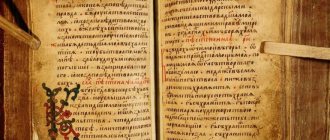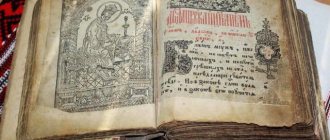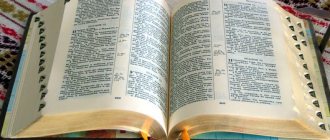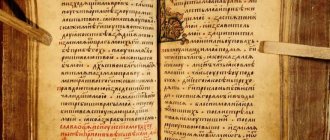The meaning of the psalm
Scripture scholars have never found the reason that formed the basis of the unique psalm. Psalm 89 is the only prayer of Moses included in the book of songs of the Lord, written by the prophet in his twilight years, after emerging from difficult life situations with the support of the Lord.
In Psalm 89, Moses prays to God to be merciful to his people
The man of God, who experienced a personal meeting with the Creator more than once, wrote a prayer-intercession to the Almighty for everyone living on earth.
Important! By reading Psalm 89 in Russian, Christians, together with the great prophet Moses, can reflect and affirm the greatness and perfection of God, comparing His immortality and the brevity of human days on earth.
In Psalm 89, the psalmist gives an answer about the reason for the Lord’s wrath against the Jewish people during the exit from Egypt, this is infidelity, unbelief and failure to fulfill the Commandments.
More about the Psalms of David:
- Psalm of David 25
- Psalm of David 150
- Psalm of David 53
Psalm of David.
Intercede, O Lord, in litigation with those who litigate with me, overcome those who fight with me; take your shield and armor and rise up to help me; Draw your sword and block the path of those who pursue me; say to my soul: “I am your salvation!”
Let those who seek my soul be ashamed and disgraced; may those who plot evil against me turn back and be covered with dishonor; let them be like dust before the wind, and let the Angel of the Lord drive them away; Let their path be dark and slippery, and let the Angel of the Lord pursue them, for without guilt they hid a hole for me - their net, without guilt they dug it for my soul. May unexpected destruction come upon him, and may his net, which he hid for me, catch him; let him fall into it to destruction.
And my soul will rejoice in the Lord, it will rejoice in salvation from Him. All my bones will say: “Lord! Who is like You, who delivers the weak from the strong, the poor and needy from their plunderer?”
Unrighteous witnesses have arisen against me: what I do not know, they interrogate me; They reward me with evil for good, with orphanhood for my soul. During their illness, I dressed myself in sackcloth, exhausted my soul with fasting, and my prayer returned to my bosom. I acted as if I were my friend, my brother; I walked mournfully, with my head bowed, as if mourning my mother.
And when I stumbled, they rejoiced and gathered together; Scolders gathered against me, I don’t know why, they vilified me and didn’t stop; with hypocritical scoffers they gnashed their teeth at me.
God! How long will you look at this? Take my soul away from their atrocities, take my lonely soul away from the lions. I will glorify You in a great assembly, among a large people I will praise You, so that those who are unjustly hostile against me do not triumph over me, and those who hate me innocently do not wink at each other; for they do not speak of peace, but form evil plans against the peaceful of the earth; They widen their mouth against me; they say: “okay! Fine! our eyes have seen.”
You have seen, Lord, do not remain silent; God! don't move away from me. Move, awaken for my judgment, for my litigation, my God and my Lord! Judge me according to Thy righteousness, O Lord my God, and let them not triumph over me; Let them not say in their hearts: “Good! according to our souls! Let them not say, “We have devoured him.”
Let all who rejoice in my misfortune be ashamed and disgraced; let those who magnify themselves over me be clothed with shame and disgrace.
Let those who desire my righteousness rejoice and be glad and say continually: “May the Lord be magnified, who desires peace for His servant!” And my tongue will preach Your righteousness and Your praise every day.
Interpretation of the Psalm of Moses
At the very beginning of Moses’ prayer, we read about the exaltation of God, the establishment of His protection and help in all our days, when the Creator is the only refuge in the days of everyday storms.
1 Prayer of Moses, the Man of God
2 Lord, You are our refuge from generation to generation!
3 Before the mountains arose and the earth and the universe were created, from everlasting to everlasting you are!
4 Do not subject man to humiliation, for You said: “Return to the earth, sons of men!”
5 For a thousand years are in your sight, O Lord, like yesterday, which is already past, and like the time of the watch of the night.
6 The years of men are insignificant; Life will quickly fade, like grass: in the morning it will bloom and soon wilt; by evening its color will fade, it will turn yellow and wither.
7 For we have fainted from Your wrath, and from Your wrath we have become dismayed.
8 You look at our iniquities, you illuminate our lives with the radiance of Your face.
9 For our days are shortening, and we are faint from Your wrath.
10 The years of our life are scattered like cobwebs; the measure of our years is seventy years, but if we are able, it is eighty years, plus sorrow and illness; by this we gain humility and are edified.
11 Who will know the power of Your anger, and in the fear of You who will comprehend Your wrath?
12 Therefore show me Your saving right hand and people who have strengthened the heart with wisdom!
13 Turn your gaze to us, O Lord! How long will you be angry? Have mercy on Your servants!
14 Let us be filled with Thy mercy in the morning, O Lord, and rejoice and be glad;
15 We will rejoice all our days, for the days when You humbled us, for the years when we experienced evil.
16 Look on Your servants, on Your creations, and instruct their sons!
17 And may the light of the Lord our God shine upon us. Correct the works of our hands, correct the works of our hands!
Moses emphasizes that everything, heaven and earth, was created by God, who is Alpha and Omega, the Beginning and the End.
- Human life is fleeting, the prophet in verse 4 begs the Creator to guide the human soul through life so that at the end of life a person is not humiliated, rejected, given over to the power of Satan. Only the body of Christians returns to dust, and the soul of the righteous goes to the Creator, to Heaven, from where it came by the will of the Almighty.
- Verses 5-6 describe how short life on earth is, for the Lord a thousand years are like one day, and the life of people is like a flower that blooms in the morning and withers by night. A person who cares more about earthly goods should think about these words.
All is vanity of vanities, wrote King Solomon, if there is no God in it.
Earthly life flies by instantly, people fuss around material wealth, forgetting about love for the Creator and neighbor, for this is the only road leading to eternity. Earthly life and stay in eternity are synonyms, one is a continuation of the other .
There is no righteous person without sin on earth, the Lord is a strict Judge, He punishes us in anger, sometimes He becomes furious at human iniquities, but all this is for the good of people. Being in the wrath of the Lord, a person begins to repent, confess, renouncing a sinful life. The face of the Creator is revealed to the sinner in all its grandeur and light when purity of soul and heart comes.
- Verses 9-11 again emphasize the shortness of life. What are 70 - 80 years compared to eternity, if the main part of them consists of sorrows, illnesses, vanity and futile suffering.
Good is the man who, in the power of the wrath of the Lord, discerns the hand of salvation. The Creator led the Jewish people through the desert for 40 years, punishing them for grumbling and sins, although this road can be covered in 2 weeks.
So in the life of Christians, some quickly come to the grace of the Creator, living according to His Laws, while others walk around it for years, remaining in sin.
Psalm 89 in Orthodoxy is usually read during funerals
- In the second part of Psalm 89, Moses turns to God in a prayer to return His mercy, to return joy, to give joy to the people after a difficult journey through the desert.
The Prophet Moses does not ask the Lord to no longer punish the Jews; on the contrary, he begs to continue to instruct his sons, to correct the works of human hands, so that the glory of the Lord will shine over the whole world.
Psalm 89
This psalm belongs to Moses, the famous leader and legislator of the Jewish people, as can be seen from the addition to this name of the epithet “man of God,” which was primarily adopted by Moses from ancient times (see Deut. 33:1; Joshua 14:6; Dan 9, etc. .). In this psalm, Moses, first confessing the extraordinary greatness of God, further depicts the insignificance and sinfulness of man before Him, speaks of the well-deserved disasters experienced by the Jews and prays to God to be merciful to them. From the contents of the psalm we can conclude that it was written at the end of Moses’ life, after a forty-year wandering, before the Jews entered Palestine, when they had already suffered punishment from God for their unbelief towards Him.
You, Lord, are eternal and unchangeable: You existed before the formation of the mountains; generations of people change, thousands of years are like one day before You, but You are one and the same (1-6). We disappear from Your wrath for our sins: our life is shortened (7-11). Teach us, O Lord, wisdom, have mercy and pour out Your favor on us (12−17).
Ps 89:2. God! You are our refuge forever and ever.
“Refuge to all generations” - the Lord, starting from the time of the election of Abraham, has always been favorable to the Jews, and since God alone is eternal, strong and constant protection can only be found in Him.
Ps 89:4. You return man to corruption and say: “Return, sons of men!”
Man is a complete nonentity before Him. The Lord “returns man to corruption” - according to the law of God, with death man returns again to the land from which he was taken.
Ps 89:5. For in Your sight a thousand years are like yesterday when it is past, and like a watch in the night.
Ps 89:6. You carry them away like a flood; they are like a dream, like grass that grows in the morning, blooms and turns green in the morning, is cut down in the evening and dries up;
The Lord is eternal, before Him a thousand years are like yesterday, that is, without a trace, and therefore an imperceptibly disappeared moment; as a “guard in the night” (night guard), divided into three parts (shifts), which go completely unnoticed for the sleeping person. The years of human life are therefore insignificant before the eternity of God; Human life can be compared to grass, which appears in the morning and dries up in the evening. Human generations are destroyed, they are carried away as if by a flood.
Ps 89:7. for we are consumed by Thy wrath, and by Thy wrath we are dismayed.
Ps 89:8. You have placed our iniquities before You and our secrets before the light of Your face.
Ps 89:9. All our days have passed in Thy wrath; we are losing our summers like a sound.
Psalm 89:10. The days of our years are seventy years, and with greater strength - eighty years; and their best time is labor and illness, for they pass quickly, and we fly.
On behalf of the people, Moses confesses before God the sinfulness and deservedness of the disasters and deprivations sent to him. The people perished from divine wrath (probably, of course, here the death of the Jews during the forty-year wandering in the desert); because the Lord knows both all their actions (“our iniquities are before You”), and even their thoughts and feelings (“our secrets are before the light of Your face” - our life is clear, open before You). The consequence of the sins of the Jews and punishment for them from God was poverty, the fragility of their external well-being and a reduction in life expectancy. Their life became impoverished and shortened; it has become as short-lived compared to the lives of previous generations as a sound is short. Life expectancy is now determined at 70 years; the stronger ones live to 80. But even this, the final time of human life, which should be the best time, since here a person should calmly enjoy the fruits of his previous working life, however, is characterized by complete weakness, helplessness and illness (“labor and illness”).
Psalm 89:11. Who knows the power of Your anger, and Your wrath according to the measure of Your fear?
Psalm 89:12. Teach us to number our days in such a way that we may acquire a wise heart.
The Jewish people previously evoked Divine wrath with their behavior, and if they do not correct themselves now, then “who knows the power of Your anger, and the wrath of Your wrath according to the measure of Your fear?” Who can know what else Your anger will manifest against him? Who can predict and count the types of disasters in advance? To avoid possible future disasters, Moses prays to God to teach him to “number the days” - to treasure the days of life in order to acquire piety and strengthen in the wise and worthy adherence to His commandments.
Psalm 89:13. Turn, Lord! How long? Have mercy on Your servants.
Psalm 89:14. Fill us early with Thy mercy, and we will rejoice and be glad all our days.
Psalm 89:15. Make us glad for the days in which You struck us, for the years in which we saw disaster.
Now Moses prays to God to hear the people's prayer for mercy, so that the Lord will fill their subsequent lives with His blessing in return for the disasters that they have experienced up to this time.
In worship, this psalm is used at the 1st hour. Just as the entry into Palestine was the beginning of a new life for the Jews, so the sunrise begins a new day in a person’s life: just as Moses then prayed for the weak Jews before God, so in the Orthodox service the Church in his words prays to God for the well-being of the believer in the coming day, recognizing the weakness his strength in the work of achieving salvation.
Found an error in the text? Select it and press: Ctrl + Enter
Lopukhin's comments on the Psalter, Psalm 89
Psalm 85
This psalm contains David's prayer to God for deliverance from the dangers he experienced while pursuing his enemies. The generality of the description of its condition and the absence of any precise historical indications of the time of origin of the psalm give equal grounds to consider it written either during persecution from Saul or from Absalom. The latter is more likely, since David calls those who rebelled against him “a crowd of rebels” (Ps. 85:14), which were all his enemies in the rebellion of Absalom, since they went against their rightful king.
Hear and protect, O Lord, me who trusts only in Your mercy, for You are good to all who call on You (1-6). In the day of trouble, I turn to You as the only true God, before whom all nations will bow (7-10). Teach me, O Lord, to follow Your truth and I will praise You for Your salvation (11-13). Rebellious enemies have risen up against me and I turn to You, the most merciful: have mercy, save me and shame my enemies (14-17).
Ps.85:1. Incline Your ear, O Lord, and hear me, for I am poor and needy.
“Poor and destitute” - I am in a distressed, financially deprived and defenseless situation.
Ps.85:4. Make glad the soul of Your servant, for to You, O Lord, I lift up my soul,
Give me fun, save me from my enemies. I seek protection from You, since I have dedicated my life to You alone (“to You I lift up my soul”) and I entrust it to You.
Ps.85:7. In the day of my sorrow I cry to You, because You will hear me.
Since my hope in You is sincere and deep, I am confident that You will hear my prayer.
Ps.85:8. Among the gods there is no one like You, O Lord, and there are no works like Yours.
Ps.85:9. All the nations created by You will come and worship before You, O Lord, and glorify Your name,
Ps.85:10. for You are great and work wonders - You, O God, are the only You.
They contain a clear and precise confession of David’s faith - You, Lord, are the one and true God, immeasurably superior to pagan deities. This truth, now held only by Jews, will eventually become the property of the whole world and all peoples.
Ps.85:11. Guide me, O Lord, in Thy path, and I will walk in Thy truth; establish my heart in the fear of Your name.
“Teach me, O Lord, on Thy path” (glory) - teach me to follow Thy commandments. - “Confirm my heart in the fear of Your name” - let reverence for You be the main foundation of my inner life. These few words clearly express the pious disposition of David, who places the happiness and joy of life in a constant and uninterrupted pious disposition.
The expression “firm” gives reason to assume that David was not always “firm,” that is, sometimes he deviated from the commandments of God. A hint of the crime with Bathsheba and indirect confirmation of the origin of the psalm from the era of persecution from Absalom.
Ps.85:13. for great is Thy mercy toward me: Thou hast delivered my soul from the depths of hell.
“Delivered my soul from hell” - saved, or more precisely, saved my life from death several times.
Ps.85:14. God! the proud have risen up against me, and a crowd of rebels seeks my soul: they do not represent You before them.
“They do not imagine You before them” - see Ps. 53:5.
Ps.85:16. look upon me and have mercy on me; Grant Thy strength to Thy servant, and save the son of Thy servant;
“Grant strength” - the strength to endure persecution. “Grant” this power is the gift of God, and not the merits of David.
Psalms 83, 84 and 85 form the content of the 9th hour, dedicated to the remembrance of the death of the Savior. The Savior's death on the cross freed man from the power of the devil and sin, brought him out of the “valley of mourning” (Ps. 83:7), from the captivity of sin (Ps. 84:2), giving him New Testament mercies and blessings (Ps. 84:11). The great work of man's redemption will be accompanied by the conversion of all pagans to God (Ps. 86:9) and will be worthily praised “forever” (Ps. 86:12). These psalms, using the example of Jews brought out of captivity to clarify the meaning of the sacrifice of Christ that was to be offered at the liturgy, serve as a good guide for creating an appropriate mood in those praying and present at the liturgy.
How does the Orthodox prayer Psalm 85 help?
comments 2
The Christian text of Psalm 85 is the only one in the third book of Psalms attributed to the authorship of King David. As the interpretation says, Psalm 85 is a collection of excerpts from other Davidic songs of the Psalter, and is dedicated, like many previous ones, to the theme of persecution that the author experienced at different periods of his life.
In the church text of Psalm 85, the king calls himself a poor beggar, implying not his financial condition, but spiritual poverty: in these words he expresses his position as an exile, betrayed by friends and forced to wander.
When is it recommended to read Psalm 85?
Christian Psalm 85 can be read to people who are wavering in their faith, because it contains David's confessions that he did not always stand firm on his path of salvation, from time to time deviating into sin and folly.
In the text of Psalm Eighty-five, he asks God to confirm him, that is, to help him become resistant to various temptations, and live the rest of his life in accordance with God’s commandments. At the same time, David realizes that such firmness will not be his personal merit, but a manifestation of God’s mercy. In addition, the Orthodox Church advises reading and listening to Psalm 85 in the event of the spread of deadly epidemics.
Listen to the video of the Orthodox prayer Psalm 85 in Russian
Read the text of the prayer Psalm 85 in Russian
David's Prayer.
Incline Your ear, O Lord, and hear me, for I am poor and needy. Preserve my soul, for I revere You; Save, my God, Your servant who trusts in You. Have mercy on me, Lord, for I cry to You every day. Make glad the soul of Your servant, for to You, Lord, I lift up my soul, for You, Lord, are good and merciful and abundantly merciful to all who call on You. Hear, O Lord, my prayer and listen to the voice of my prayer. In the day of my sorrow I cry to You, because You will hear me. Among the gods there is no one like You, O Lord, and there are no works like Yours. All the nations created by You will come and worship before You, O Lord, and glorify Your name, for You are great and work wonders - You, O God, are the only One. Guide me, O Lord, in Thy path, and I will walk in Thy truth; establish my heart in the fear of Your name. I will praise You, O Lord my God, with all my heart and glorify Your name forever, for great is Your mercy towards me: You have delivered my soul from the underworld. God! the proud have risen up against me, and a crowd of rebels seeks my soul: they do not represent You before them. But You, Lord, generous and merciful God, long-suffering and abundantly merciful and true, look upon me and have mercy on me; Grant Thy strength to Thy servant, and save the son of Thy servant; show me a sign for good, so that those who hate me may see and be ashamed, because You, Lord, have helped me and comforted me.
Orthodox Psalter, text of Psalm 85 in Church Slavonic language
Incline your ear, O Lord, and hear me; as I am poor and wretched. Save my soul, as I am reverend; save your servant, my God, who trusts in you. Have mercy on me, Lord, as I will cry to you all day long. Make glad the soul of your servant; for I have taken my soul to you. For you, Lord, are good and meek and abundantly merciful to all who call on you. Inspire, Lord, my prayer and listen to the voice of my prayer. On the day of my sorrow I cried out to you, because you heard me. There is no one like you in God, O Lord, and there is no one according to your deeds. All the nations, the great things you have created, will come and bow before you, O Lord, and glorify your name; Because you are great and you work miracles, you are the only God. Guide me, O Lord, in your path, and I will walk in your truth; let my heart rejoice in fearing your name. Let me confess to you, O Lord my God, with all my heart, and I will glorify your name forever; for your great mercy is upon me, and you have delivered my soul from the lowest hell. God, the lawbreakers rose up against me, and the host of the powerful sought my soul, and did not offer it to you before them. And you, Lord my God, generous and merciful, long-suffering and abundantly merciful and true, look upon me and have mercy on me; give thy dominion to thy servant, and save the son of thy servant. Do a sign for good with me; and let those who hate me see and be ashamed, because you, Lord, have helped me and consoled me.





